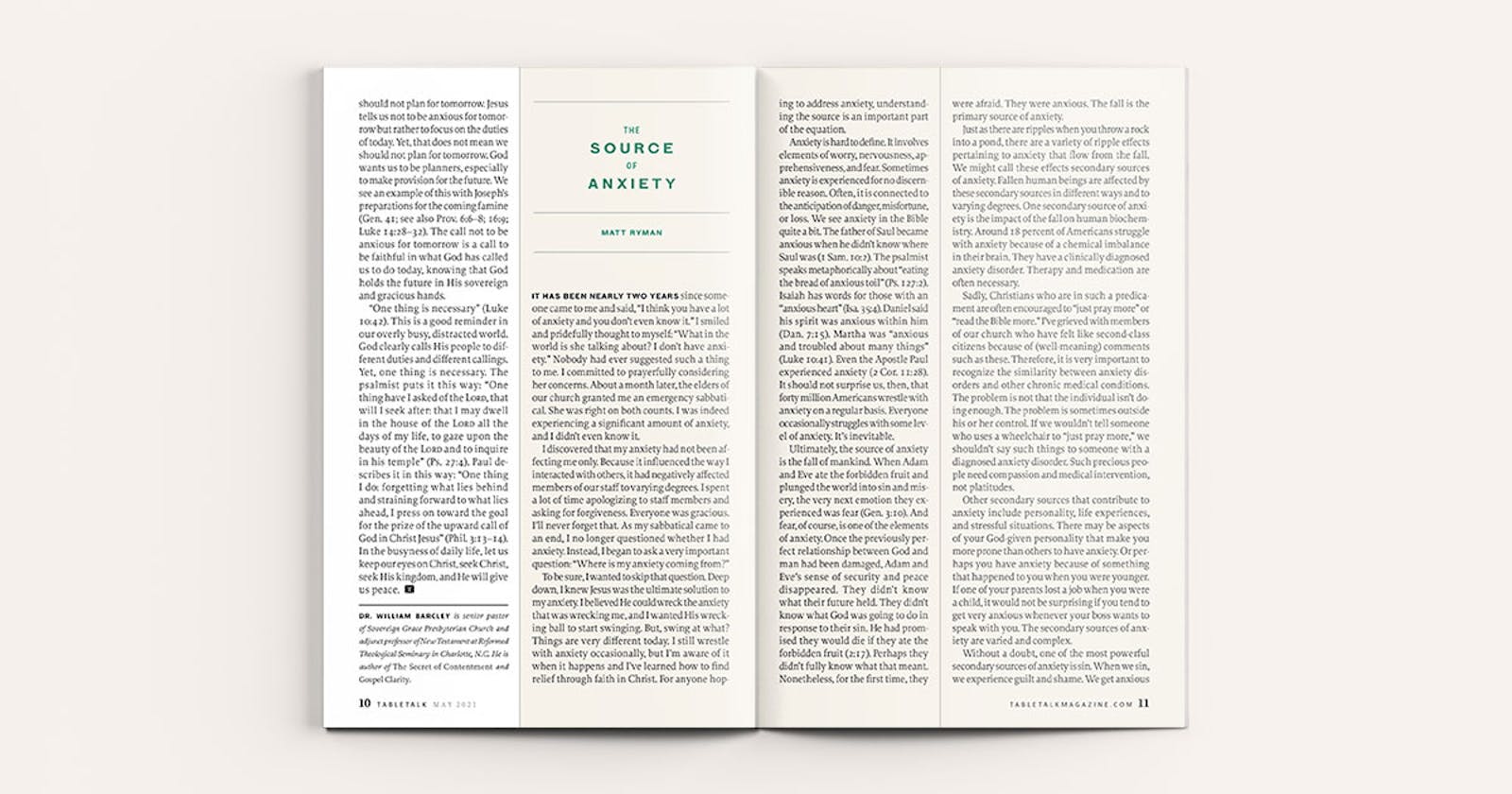
Request your free, three-month trial to Tabletalk magazine. You’ll receive the print issue monthly and gain immediate digital access to decades of archives. This trial is risk-free. No credit card required.
Try Tabletalk NowAlready receive Tabletalk magazine every month?
Verify your email address to gain unlimited access.
It has been nearly two years since someone came to me and said, “I think you have a lot of anxiety and you don’t even know it.” I smiled and pridefully thought to myself: “What in the world is she talking about? I don’t have anxiety.” Nobody had ever suggested such a thing to me. I committed to prayerfully considering her concerns. About a month later, the elders of our church granted me an emergency sabbatical. She was right on both counts. I was indeed experiencing a significant amount of anxiety, and I didn’t even know it.
I discovered that my anxiety had not been affecting me only. Because it influenced the way I interacted with others, it had negatively affected members of our staff to varying degrees. I spent a lot of time apologizing to staff members and asking for forgiveness. Everyone was gracious. I’ll never forget that. As my sabbatical came to an end, I no longer questioned whether I had anxiety. Instead, I began to ask a very important question: “Where is my anxiety coming from?”
To be sure, I wanted to skip that question. Deep down, I knew Jesus was the ultimate solution to my anxiety. I believed He could wreck the anxiety that was wrecking me, and I wanted His wrecking ball to start swinging. But, swing at what? Things are very different today. I still wrestle with anxiety occasionally, but I’m aware of it when it happens and I’ve learned how to find relief through faith in Christ. For anyone hoping to address anxiety, understanding the source is an important part of the equation.
Anxiety is hard to define. It involves elements of worry, nervousness, apprehensiveness, and fear. Sometimes anxiety is experienced for no discernible reason. Often, it is connected to the anticipation of danger, misfortune, or loss. We see anxiety in the Bible quite a bit. The father of Saul became anxious when he didn’t know where Saul was (1 Sam. 10:2). The psalmist speaks metaphorically about “eating the bread of anxious toil” (Ps. 127:2). Isaiah has words for those with an “anxious heart” (Isa. 35:4). Daniel said his spirit was anxious within him (Dan. 7:15). Martha was “anxious and troubled about many things” (Luke 10:41). Even the Apostle Paul experienced anxiety (2 Cor. 11:28). It should not surprise us, then, that forty million Americans wrestle with anxiety on a regular basis. Everyone occasionally struggles with some level of anxiety. It’s inevitable.
Ultimately, the source of anxiety is the fall of mankind. When Adam and Eve ate the forbidden fruit and plunged the world into sin and misery, the very next emotion they experienced was fear (Gen. 3:10). And fear, of course, is one of the elements of anxiety. Once the previously perfect relationship between God and man had been damaged, Adam and Eve’s sense of security and peace disappeared. They didn’t know what their future held. They didn’t know what God was going to do in response to their sin. He had promised they would die if they ate the forbidden fruit (2:17). Perhaps they didn’t fully know what that meant. Nonetheless, for the first time, they were afraid. They were anxious. The fall is the primary source of anxiety.
Just as there are ripples when you throw a rock into a pond, there are a variety of ripple effects pertaining to anxiety that flow from the fall. We might call these effects secondary sources of anxiety. Fallen human beings are affected by these secondary sources in different ways and to varying degrees. One secondary source of anxiety is the impact of the fall on human biochemistry. Around 18 percent of Americans struggle with anxiety because of a chemical imbalance in their brain. They have a clinically diagnosed anxiety disorder. Therapy and medication are often necessary.
Sadly, Christians who are in such a predicament are often encouraged to “just pray more” or “read the Bible more.” I’ve grieved with members of our church who have felt like second-class citizens because of (well-meaning) comments such as these. Therefore, it is very important to recognize the similarity between anxiety disorders and other chronic medical conditions. The problem is not that the individual isn’t doing enough. The problem is sometimes outside his or her control. If we wouldn’t tell someone who uses a wheelchair to “just pray more,” we shouldn’t say such things to someone with a diagnosed anxiety disorder. Such precious people need compassion and medical intervention, not platitudes.
Other secondary sources that contribute to anxiety include personality, life experiences, and stressful situations. There may be aspects of your God-given personality that make you more prone than others to have anxiety. Or perhaps you have anxiety because of something that happened to you when you were younger. If one of your parents lost a job when you were a child, it would not be surprising if you tend to get very anxious whenever your boss wants to speak with you. The secondary sources of anxiety are varied and complex.
Without a doubt, one of the most powerful secondary sources of anxiety is sin. When we sin, we experience guilt and shame. We get anxious thinking about the possible consequences. Think of the fear and distress Jacob felt when he found out that Esau, whom he had defrauded (twice), was coming his way (Gen. 32:7). King David spoke of deep internal conflict stemming from unconfessed sin (Ps. 32:3). James tells us to “confess [our] sins to one another and pray for one another, that [we] may be healed” (James 5:16). Surely part of our healing is relief from sin-related anxiety. The good news is that we serve a God of grace who is always ready to forgive us and renew us in Christ.

Another significant secondary source of anxiety is weak faith. Consider what Jesus says in Matthew 6:25–34. He instructs us not to be anxious about getting our basic needs met (food, clothing). Notice how He compares our value with the value of birds (v. 26). If we do not believe we are valuable to God, we will be anxious about whether He will provide for us. Jesus also says being anxious cannot extend our lives (v. 27). If we’re not sure what will happen when we die, we will not be able to avoid feeling anxious about our inevitable deaths. Then Jesus refers to clothing (v. 28). Apparently, worrying about our appearance isn’t anything new. Finally, Jesus connects all three of these forms of anxiety with one cause: “O you of little faith” (v. 30).
Someone with anxiety may simply need to strengthen his faith in the sovereignty, goodness, and faithfulness of God. He may need to spend much more time considering the way the cross reveals how valuable we are to God. Jesus teaches that there is a clear connection between having strong faith and having less (nonclinical) anxiety. He does not, however, teach that we can have enough faith to permanently eliminate anxiety. We must be careful not to equate strong faith with the absence of anxiety. The Apostle Paul had stronger faith than perhaps any other human being in history, yet, as mentioned above, he experienced anxiety. But we shouldn’t assume there is nothing we can do about our anxiety. Once we have identified the secondary sources of our anxiety, we must ask ourselves and others what it might look like if we were to have stronger faith. In my case, my anxiety was coming largely from a dangerous mix of pride and an unmanageable workload. I was trying to do way too much, I wasn’t asking for help, and I was getting crushed by the weight of more responsibility than I could carry. Strengthening my faith in Christ required being willing to take on less at work.
Understanding the primary source of anxiety and identifying secondary sources is a critically important step toward freedom. Awareness of such things helps us in two ways. First, it helps us to be kind, compassionate, and patient with people who are experiencing anxiety. Knowing anxiety has a complex set of causes prevents us from suggesting simple solutions. It enables us to help people who have anxiety instead of inadvertently causing them even more worry or fear. Second, understanding the primary source and identifying the secondary sources of anxiety are exercises of hope.
Nothing is too hard for the Lord (Gen. 18:14). All things are possible with God (Matt. 19:26). And, we can do all things through Christ who strengthens us (Phil. 4:13). Many, many Christians (including me) have become even more convinced of these truths because of the way the Lord has graciously and powerfully helped them handle, and even overcome, anxiety. If you struggle with anxiety, two things are true. You need help, and your help comes from the Lord (Ps. 121:2).
